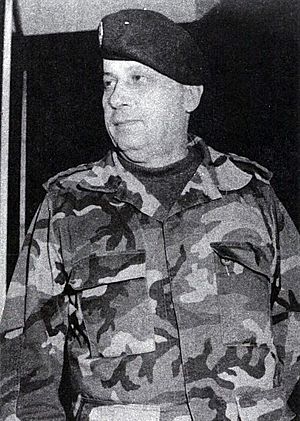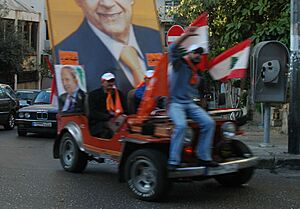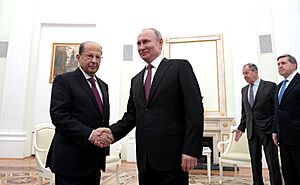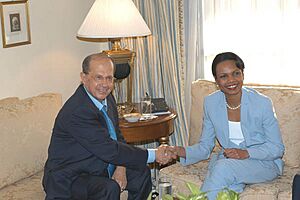Michel Aoun facts for kids
Quick facts for kids
General
Michel Aoun
|
|
|---|---|
|
ميشال عون
|
|

Aoun in 2022
|
|
| 13th President of Lebanon | |
| In office 31 October 2016 – 31 October 2022 |
|
| Prime Minister |
See list
|
| Preceded by | Michel Suleiman |
| Succeeded by | Najib Mikati (acting) Joseph Aoun |
| Acting 22 September 1988 – 13 October 1990^ Disputed |
|
| Prime Minister | Himself (acting) |
| Preceded by | Amine Gemayel |
| Succeeded by | Elias Hrawi |
| Acting Prime Minister of Lebanon | |
| In office 22 September 1988 – 13 October 1990^^ Disputed |
|
| President | Himself (acting) |
| Preceded by | Selim Hoss |
| Succeeded by | Selim Hoss |
| Member of Parliament | |
| In office 20 April 2005 – 31 October 2016 |
|
| Succeeded by | Chamel Roukoz |
| Constituency | Keserwan District |
| 10th Commander of the Lebanese Armed Forces | |
| In office 23 June 1984 – 27 November 1989 |
|
| President |
|
| Preceded by | Ibrahim Tannous |
| Succeeded by | Émile Lahoud |
| Personal details | |
| Born |
Michel Naim Aoun
30 September 1933 Haret Hreik, Beirut, Lebanon |
| Political party | Free Patriotic Movement |
| Other political affiliations |
March 8 Alliance |
| Spouse |
Nadia El-Chami
(m. 1968) |
| Children | 3 |
| Awards | OM ONC |
| Signature | |
| Nicknames | Jebrayel, Raad The General |
| Military service | |
| Allegiance | |
| Branch/service | Lebanese Army |
| Years of service | 1958–1991 |
| Rank | General |
| Battles/wars | Lebanese Civil War |
|
|
Michel Naim Aoun (born 30 September 1933) is a Lebanese politician and former general. He served as the 13th president of Lebanon from October 2016 to October 2022.
Born in Haret Hreik into a Maronite Christian family, Aoun joined the Military Academy in 1955. He became an artillery officer in the Lebanese Army. In 1984, he was named the youngest Commander of the Army at 49.
In September 1988, during the Lebanese Civil War, the outgoing President Amine Gemayel appointed Aoun as interim Prime Minister. This happened after the parliament could not elect a new president. This decision led to two rival governments in Lebanon.
Aoun declared the War of Liberation against Syrian Army forces in March 1989. He opposed the Taif Agreement and did not recognize the newly elected presidents. In October 1990, Syrian forces attacked his strongholds. Aoun fled to the French Embassy in Beirut and later lived in exile in France for 15 years.
While in exile, Aoun started the Free Patriotic Movement. He returned to Lebanon in May 2005 after Syrian troops left the country. This followed widespread protests known as the Cedar Revolution.
Aoun was elected to Parliament in 2005. His party became the largest Christian group in Parliament. In 2006, he signed an agreement with Hezbollah, forming a strong alliance. In 2008, he visited Syria, ending a long rivalry.
In 2016, Aoun became the 13th President of Lebanon. He was 83 years old, making him the oldest president to take office. After his election, he was sworn in.
In 2019, Lebanon faced a major crisis. A popular uprising began, with many Lebanese protesting. This was mainly due to economic problems, political corruption, and the country's political system.
Contents
Early Life and Education
Michel Aoun was born in Haret Hreik, a suburb south of Beirut. His family was not wealthy. His father, Naim Aoun, worked as a butcher. His mother, Marie Aoun, was born in the United States.
In 1941, his family had to leave their home because British and Australian forces occupied it. He finished high school in 1955 with a degree in Maths. He then joined the Military Academy as a cadet officer. Three years later, he became an artillery officer in the Lebanese Army.
Military Service
After graduating, Aoun joined the Second Artillery Regiment in 1958. He went to France for more military training. He was promoted to Second Lieutenant in September 1959.
He served during the failed coup by the Syrian Social Nationalist Party in 1961. He received an award for his service. He also trained in Oklahoma, USA.
At the start of the civil war, Aoun commanded the Second Artillery Corps. He was involved in the Tel al-Zaatar massacre. He later went to France again for more military training in 1978.
In 1980, Aoun returned to Lebanon. He was appointed interim commander of the 8th Infantry Brigade. This brigade protected the Borj Al Barajneh refugee camp. They also fought against pro-Syrian militias in the Mountain War.
He was promoted to General and became the tenth Commander of the Armed Forces in June 1984. At 49, he was the youngest commander in that position.
Two Governments: 1988
On 22 September 1988, President Amine Gemayel appointed Aoun as Prime Minister. He was to lead a military government. However, Muslim members refused to serve. This led to two rival governments. One was a civilian government in West Beirut, led by Selim al-Huss. The other was a military government in East Beirut, led by Michel Aoun.
Gemayel's decision was controversial. It went against an unwritten rule that the Prime Minister should be a Sunni Muslim. However, Gemayel argued that if the President (a Maronite Christian) could not serve, a Maronite should temporarily fill the Prime Minister's role.
War Against Syria: 1989
In February 1989, General Aoun launched an attack against Geagea's Lebanese Forces positions. This was around Christian East Beirut. After nine days, they agreed to a ceasefire.
The next month, Aoun blocked unregulated seaports south of Beirut. This led to more fighting and artillery attacks. In March, Aoun ordered the closure of Beirut International Airport. He also launched a bombardment of East Beirut.
In October 1989, Lebanese Parliament members met to create the Taif Agreement. This agreement aimed to end the Lebanese conflict. Aoun refused to attend and rejected the agreement. He wanted the Syrian army to leave Lebanon.
After the Taif Accord was signed, René Moawad was elected president. Moawad's presidency ended 17 days later when he was assassinated. Elias Hrawi was elected in his place. Hrawi ordered Aoun to leave the Presidential Palace, but Aoun refused.
In February 1990, General Aoun launched another attack against Samir Geagea's Lebanese Forces. This fighting caused much damage in Christian Beirut. It ended with the Lebanese Forces still controlling East Beirut.
The Gulf War affected Aoun's government. Saddam Hussein of Iraq was an ally of Aoun. When Hussein invaded Kuwait, Syria sided with the US-led coalition. This allowed Syria to act against Aoun. On 13 October 1990, Syrian forces attacked the presidential palace. Aoun took refuge at the French Embassy and ordered his units to surrender.
Life in Exile (1990–2005)
France gave Aoun political asylum. He left for France in August 1991. There, he started his exile.
In July 1994, he founded the Free Patriotic Movement. He worked with Lebanese people living abroad to change American views on Lebanon.
In 2001, he visited the United States. He met with senators and representatives. He aimed to end the Syrian occupation of Lebanon. Later, tensions grew between the US and Syria. A bill called the Syria Accountability Act was introduced. Aoun testified in Congress in September 2003. He criticized Syria's actions. The bill was approved and signed into law.
Return to Lebanon: 2005
Aoun ended 15 years of exile on 7 May 2005. This was after the Syrian Army left Lebanon. Their withdrawal followed the assassination of Rafic Hariri in February 2005. Hariri's death led to big political changes and the Cedar Revolution.
Aoun held a press conference at Beirut International Airport. He then visited the "Grave of the Un-named Soldiers and Martyrs" and Rafic Hariri's grave. He also visited Samir Geagea, who was in prison. Aoun's journey continued to Martyr's Square, where supporters greeted him.
After his return, Aoun moved into a home in Lebanon's Rabieh district. Many political figures visited him. Even the Shiite Muslim Hezbollah Party sent a delegation.
Political Journey
2005 Elections
In the elections in May 2005, Aoun's party, the Free Patriotic Movement, performed strongly. They won 21 of the 58 seats in that round. This included most seats in the Christian area of Mount Lebanon. Aoun himself was elected to the National Assembly. The FPM became the largest Christian group in Lebanon's Parliament.
Agreement with Hezbollah
In 2006, Michel Aoun and Hassan Nasrallah met. They signed an agreement between the FPM and Hezbollah. This agreement discussed their relationship and Hezbollah's weapons under certain conditions. It also talked about having normal relations with Syria.
After this event, Aoun and his party joined the March 8 Alliance.
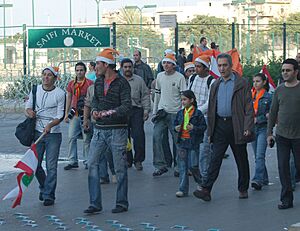
Anti-Government Protests: 2006–2008
On 1 December 2006, Michel Aoun told protesters that the Lebanese government was not legal. He claimed the government was corrupt and called for its resignation. Hundreds of thousands of supporters gathered in Downtown Beirut.
In July 2008, Aoun's party joined the Lebanese government for the first time. FPM members became Deputy-Prime Minister and ministers.
2009 Elections and Government
The 2009 elections gave the FPM 27 parliamentary seats. Aoun won a seat from Keserwan.
In November 2009, after much political pressure from Aoun, Prime Minister Saad Hariri formed a new government. The Free Patriotic Movement nominated three ministers.
In January 2011, the Hariri government was overthrown when FPM ministers resigned. In June 2011, a new government was formed. Aoun's parliamentary group held 10 ministries.
Presidential Candidacy in 2016
Lebanese Forces leader Samir Geagea and Michel Aoun made a historic step. Geagea officially supported Aoun's candidacy for president. They signed a 10-point agreement. This agreement included following the Taif Accord and stopping the flow of weapons across the Lebanese-Syrian border.
Geagea's support greatly boosted Aoun's chances. On 20 October 2016, Saad Hariri also publicly supported Aoun for president. This made his election very likely.
Election as President
On 31 October 2016, Aoun was elected president of Lebanon. This ended a 29-month period without a president. The parliament met for the 46th time to elect a president.
In the first round, Aoun needed 85 votes but received 83. The second round had to be repeated several times due to extra ballots. Eventually, Aoun received 83 votes and was elected.
Aoun was quickly sworn in. He promised political and economic reforms. He urged different Lebanese political groups to work together. He returned to the presidential palace exactly 26 years after Syrian forces had forced him out.
Presidency (2016–2022)
Hariri Cabinets
After his election, Aoun appointed Saad Hariri to form a new government. This was a national unity government with 30 ministers. It won the parliament's trust in December 2016.
In November 2017, Hariri resigned from Saudi Arabia. He blamed Iran's policies and its interference in Lebanese affairs. He also called Hezbollah a threat. Iran said his resignation was a plot by the US, Israel, and Saudi Arabia. Hezbollah's leader called it a Saudi declaration of war on Lebanon. Aoun informed foreign ambassadors that Hariri was being held in Saudi Arabia.
Hariri returned to Beirut in November. He suspended his resignation after meeting Aoun. In December, he officially withdrew it.
In August 2017, Aoun signed Lebanon's first animal protection law. This law protects domestic and wild animals from abuse.
In January 2019, a new Lebanese government was formed, again led by Saad Hariri. It took nine months to form due to long negotiations.
2019 Protests
Large anti-government protests began in Lebanon on 17 October 2019. They started because of new taxes and rising prices. But they quickly grew into a revolution against economic problems, government failures, and corruption. Hundreds of thousands of people protested across the country.
President Michel Aoun spoke to the public on 24 October. He said he was willing to talk with the protesters. He supported Hariri's reforms but said the government needed review. Protesters rejected talks until the government resigned.
On 12 November, Aoun gave a live interview. He rejected calls for a fully expert government. He warned against economic damage and called for an end to protests. Aoun accused protesters of "stabbing the nation" and blocking roads. His interview was very unpopular with the protest movement. Protesters then blocked many roads in Beirut and across Lebanon.
Diab Cabinet and Leadership Gap
Hassan Diab was appointed prime minister by President Michel Aoun in January 2020. This followed Saad Hariri's resignation after the 2019 protests. The new cabinet was formed after nearly three months of talks.
On 10 August 2020, the government resigned after public anger over the 2020 Beirut explosion. Aoun accepted the resignation and asked the government to continue until a new one was formed. Aoun denied involvement in the explosion but admitted knowing about the ammonium nitrate.
In March 2021, Diab criticized the political and economic crisis. He threatened to stop working. Saad Hariri was again appointed to form a new government. However, he and Aoun disagreed on ministerial posts. Hariri gave up forming a government in July 2021.
2020 Beirut Port Explosion
On 4 August 2020, a large amount of ammonium nitrate exploded at the Port of Beirut. This caused many deaths, injuries, and huge property damage. It also left many people homeless. The substance had been stored in a warehouse for six years without proper safety. The exact cause of the explosion is still being investigated.
End of Presidency
Aoun signed the government's resignation decree one day before his six-year term ended. Prime Minister Najib Mikati's government remained in office temporarily. Aoun's term officially ended on 31 October 2022. No successor was chosen at that time.
In June 2023, former president Michel Aoun visited Damascus, Syria. Syrian President Bashar al-Assad said he would not interfere in Lebanon's next presidential election. In January 2025, Joseph Aoun (not related to Michel Aoun) was elected to succeed him as president.
Political Approach
In February 2006, Aoun signed an agreement with Hezbollah. His current approach is a "war against corruption."
Since Syrian forces left Lebanon, General Aoun has tried to improve relations with Syria. He sees all Lebanese groups as potential partners for change. The agreement with Hezbollah fits into this idea.
In September 2015, Aoun supported his son-in-law, Foreign Minister Gebran Bassil, for the FPM leadership. Bassil was elected after his main opponent, Aoun's nephew, withdrew.
Political Views and Relationships
The West
In May 2008, Aoun explained why he turned away from the West. He said:
We chose this long-term political option, because we knew that the interests of the West do not lie with us. Its interests lie with Israel, on one hand, and with the oil, on the other hand. We are not included among its interests at present. The only thing it cares about is resolving the problem of Israel at our expense, through the naturalization of the Palestinians in Lebanon, and pleasing the oil-producing countries, because its material interests lie there. Therefore, we had to choose a policy of coordination with all elements of Lebanese society, and with our neighboring countries, in order to build strong, solid, and mutual relations. Lebanese society in general, and the Christians in particular, are not used to this, and therefore, it has aroused fear and concern. However, our confidence in ourselves, in the choice we made, and in our views have made it possible for us to stand before you, and to ask you to give the efforts we are undertaking a chance. A short while ago, in Doha, we saw the results.
All the Christians in the Middle East, all the Christians in the Middle East are fleeing, while the Christians of Lebanon are returning. The forecasts of the entire world. For 25–35 years, we have been reading that the Christians in the Middle East are becoming extinct. Western policies have led the Christians in the Middle East towards extinction. Western policies have not left a single Christian in Palestine and the holy places. Western policies have not left a single Christian in Iraq. They intended to get rid of us by marginalizing us, and by treating us as a superfluous element in society.
Iran and Hezbollah
Aoun's political group has a strong alliance with Hezbollah. This alliance has been very important for his political career. He has defended Hezbollah's right to have weapons. He sees their military strength as vital for Lebanon. In February, he said that "resistance weapons" are needed to fight "against the Israeli occupation." Hezbollah has used its alliance with Aoun to gain Christian support and expand its influence.
United States
In a December 1995 interview, Aoun was asked if he disliked the United States. He replied:
Here I must defend myself. My grandfather and cousins fought in the American army. My mother was born in the United States (in Jaffrey, New Hampshire), my sister and her family live in the United States, including my nephews. I studied in the United States. I have never been against the United States and have always respected Americans, a democratic people who forward their values and peace, as we do. I cannot be against the United States; besides, politically, I am linked to American politics. How could anyone say I am anti-American? But I regret the American position on Lebanon. I pray for the day when the United States will correctly see Lebanon.
I know the power of the United States, its influence in the world. I know that it can crush anyone who resists its wishes. At the same time, I will defend myself against the United States even if it crushes me, I will only engage in self-defense.
[...]
It's not just a matter of convincing the American people, but of convincing those who make policy in the United States. They should know that Lebanon is an antidote to much that is wrong with the Middle East. Fundamentalist Islam is creating a fundamentalist Judaism, for action always leads to reaction. If Lebanon fails, how can tolerant societies be built in the Middle East? No land of tolerance will emerge without Lebanon. Remove Lebanon and that hope is gone.
Syria
During the Lebanese Civil War, Aoun fought against Syrian forces in Lebanon. After returning to Lebanon in 2005, Aoun began to support better relations with Syria. He said, "This is an old story that is now over. We must have better relations with Syria." Aoun visited Syria in 2008. He predicted a "bright future" for ties between Lebanon and Syria. As president, Aoun took a friendlier stance towards Syria. He sent ministers to Damascus to help Syrian refugees return.
In 2015, he stated that no Lebanese detainees remained in Syria. This was later proven false. After the fall of the Assad regime, many prisoners were freed. This included Lebanese people held since the Civil War. Aoun was criticized for this.
Family Life
Michel Aoun is the son of Naim and Marie Aoun. He married Nadia El-Chami on 30 November 1968. They have three daughters.
His first daughter, Mireille Aoun, is his personal advisor. She is married to Roy Hachem, the CEO of Aoun's OTV.
His second daughter is Claudine Aoun. She has been president of the Arab Women Organization since 2019. She is also president of the National Commission For Lebanese Women since 2017. She is married to Brigadier-General Chamel Roukoz, a decorated officer. He is also a Member of Parliament.
His third daughter, Chantal, is married to Gebran Bassil. She met him at a conference in Paris in 1996. He served as a minister and succeeded Aoun as president of the Free Patriotic Movement in 2015.
His nephew, Alain Aoun, is also a Member of Parliament.
Michel Aoun is not related to Joseph Aoun. Joseph Aoun was Commander of the Lebanese Armed Forces during Michel Aoun's presidency. Joseph Aoun succeeded him as President of Lebanon in 2025.
Awards and Honors
National Awards
Foreign Awards
| Ribbon | Description | Notes | Ref. |
|---|---|---|---|
| Commander of the French Legion of Honor | |||
| Grand Cross of the French Legion of Honour | Received from Emmanuel Macron on September 27, 2017 |
See also
 In Spanish: Michel Aoun para niños
In Spanish: Michel Aoun para niños
- Free Patriotic Movement
- List of presidents of Lebanon
- List of prime ministers of Lebanon
- History of Lebanon#Republic of Lebanon
- Lebanese Civil War (1975–1990)
 | May Edward Chinn |
 | Rebecca Cole |
 | Alexa Canady |
 | Dorothy Lavinia Brown |


